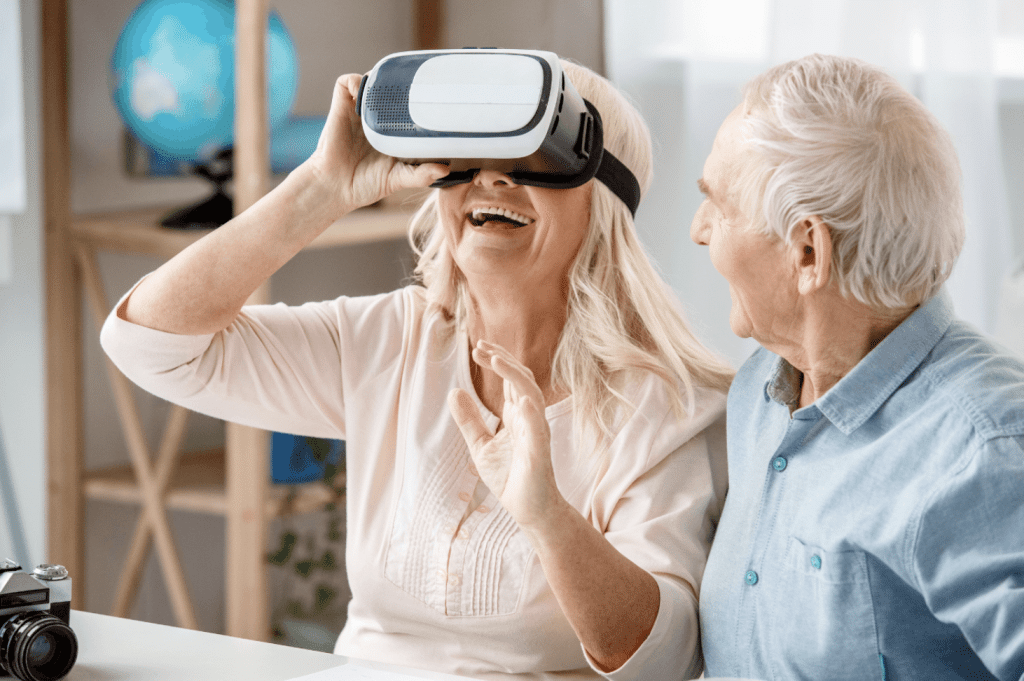Innovators across the UK are exploring the vast potential of virtual reality (VR) technology to enrich care and quality of life for people living with dementia. From stimulating cognitive abilities to reducing anxiety, customised VR experiences show immense promise in providing person-centred therapeutic support.
While it is still early days, the potential to include newer technology in specialist dementia care is something that could potentially help to reduce the stress and fear those living with dementia are often left to face.
Bringing Positive Memories to Life
Charities like Alzheimer Scotland utilise VR to craft engaging sensory environments tailored to an individual’s rich life history, preferences, needs and abilities. These deeply personalised virtual worlds tap into long-term memories to immerse people in nostalgic scenes from their past.
Watching his former RAF base come to life before his eyes through the VR headset, Gordon, who lives with Lewy Body dementia, is transported back to his glory days as a pilot. The intricate detail vividly rekindles positive emotions and pride which uplift his mood.
Through reminiscence therapy, VR also stimulates conversation, bringing families and carers closer together as they immerse in shared nostalgic moments. Laughing over childhood stories or admiring historic events, these interactions focus on enduring personality connections rather than dementia symptoms.
Pioneering Research Confirms Benefits
The great potential of VR to improve quality of life and care for people living with dementia is evidenced by recent research.
A 2022 Stanford University study observed elderly participants engaging with VR across 17 retirement communities. Among the 245 people aged 65-103 who took part, 80% reported more positive emotions after their VR session. Almost 60% also felt less lonely and isolated thanks to the sense of adventure and human interaction the technology facilitated.
Notable improvements in memory recall and engagement have also emerged specifically amongst dementia residents interacting with VR. Care staff can incorporate personalised VR to help trigger conversations or manage anxiety according to individual needs.
Adapting VR for Accessibility
While holding great potential, virtual reality technologies must cater to age-related sensory decline to avoid exclusion. Industry innovators are addressing areas like headset discomfort, disorientation and nausea through more senior-friendly designs.
Integrating tools like Google Earth VR also allows people to virtually revisit meaningful places from their past without travel barriers. This helps maintain connections to personal identity.
Along with hardware adaptations, VR experiences themselves should accommodate declining mobility, sight, hearing and cognition. Gentle pacing, high visual contrast, amplified audio and intuitive controls all help maximise accessibility. Multi-sensory elements like scents or tactile features in real world props further enrich immersion.
VR’s Role in the Future of Dementia Care
As virtual reality technology and design continues rapid innovation, we move closer to unlocking its full quality of life and care potential for people living with dementia.
Used inventively, VR provides a powerful tool to creatively stimulate minds, enhance health and enrich care. Whether it’s flying a plane, attending a grandchild’s wedding, or simply sitting by a tranquil lake, virtual environments offer people beautiful respite, adventure and nostalgia.
Continued research and collaboration between aged care providers, VR specialists and dementia experts will help this technology be harnessed most effectively. With compassion and person-centred care at the core, virtual reality looks set to transform experiences and support for people living with dementia.
